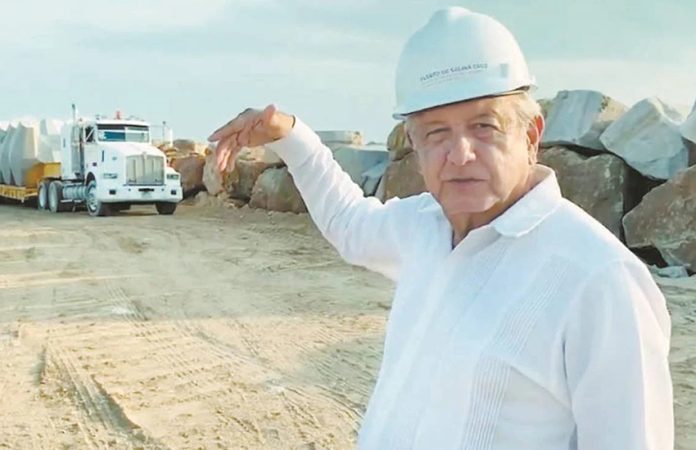The navy will be given control of the new Isthmus of Tehuantepec trade corridor once it is completed, President López Obrador said Sunday.
The federal government is currently modernizing the 300-kilometer corridor between Coatzacoalcos, Veracruz, on the Gulf of Mexico coast and Salina Cruz, Oaxaca, on Mexico’s Pacific side. The project, slated for completion in 2022, includes upgrades to the ports in both cities, construction of a new trans-isthmus highway and 10 industrial parks and modernization of the railroad between the Atlantic and Pacific coasts.
In a video message filmed in Salina Cruz, López Obrador said that concessions to operate the new trade corridor will not be awarded to private or foreign companies.
“It’s a matter of sovereignty, it will be managed by the state and looked after by the Ministry of the Navy,” the president said.
“It’s to the navy that we’re going to entrust all these public works when we finish them, for the good and for the progress of our country,” López Obrador said.
Management of the trade corridor will add to the long list of tasks already entrusted to the military in Mexico. López Obrador has perpetuated the militarization of public security, even though he pledged to remove soldiers and marines from the streets, assigned the construction of major infrastructure projects, including the new Mexico City airport, to the army and put the military in charge of the nation’s ports and customs offices.
The military is also playing a role in the distribution of Covid-19 vaccines, nurturing saplings for the government’s tree-planting employment program and delivering textbooks, among other nontraditional tasks.
The president has defended his heavy reliance on the armed forces, casting the military as an honest institution and an essential ally in the fight against corruption.
On Sunday, López Obrador touted a navy-managed trade corridor as a vehicle for development and “progress with justice.”
It will generate jobs and well-being, he said, adding that the government is fully funding the 4.6-billion-peso (US $231.2 million) project without taking on debt. That is possible, the president explained, because his government has generated savings through its austerity program and elimination of corruption.
“… How do we have money? … Because there’s no corruption, that’s the key to everything, … we’re saving; there are no luxuries in the government. Before there was a rich government with a poor people, the government was self-absorbed, it didn’t attend to the development of the country,” López Obrador said.
A previous trans-isthmus project undertaken by the government of late 19th- and early 20th-century president Porfirio Diáz wasn’t as successful as expected because Pacific Rim countries, especially Asian nations, weren’t as economically important as they are today, he said.
“Now it’s different,” López Obrador said. “The Pacific ports — not those on the Gulf [of Mexico], on the Atlantic — are the ones that move the most cargo by ships. Now it’s Manzanillo, Lázaro Cárdenas; before it was mainly Veracruz, perhaps also Tampico, but that’s changed now because China became the world’s factory.”
Source: El Universal (sp)
